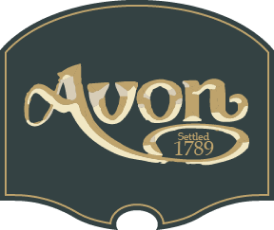Town Government: Town Profile
Avon is a community in Western New York State situated on the east bank of the Genesee River in the northern-most section of Livingston County. The first permanent settlement was made in 1789 at the river where Gilbert and Maria Berry built a log tavern and later operated a rope ferry. Dr. Timothy Hosmer and Major Isaiah Thompson with three associates from Connecticut purchased the land that is now Avon and Rush. They named their community Hartford, a name that was later changed to Avon (1808) to distinguish it from another community in the state. The town was formally organized in 1797, and the village was incorporated in 1853.
The area was well known to native peoples, hunters, trappers, explorers and missionaries who used the main trail across what is now New York State. That "trail" passes through Avon. During the Nineteenth Century Avon was famous for its mineral springs, with large hotels, bathhouses and recreational facilities built to accommodate the many who sought health cures from the rich sulfur waters.
Railroads, both passenger and freight, were prominent in the development of Avon. On July 21, 1853, passenger service between Avon and New York City opened with great fanfare. "…This road being broad gauge, and running direct to Avon Springs, is the most comfortable and expeditious route from New York to that place…." Though passenger service is no longer available, the LAL (Livonia, Avon and Lakeville) is a successful short line offering shippers an alternative or supplement to truck transport and a connection to the national railway systems.Major highways serve the people of Avon as well as those who visit the community, with Routes 5 and 20, Route 15 and Interstate 90 all offering convenient travel.
There has been considerable effort on the parts of both Town and Village to maintain a balance in this beautiful Genesee Valley community among residential development, farming, industrial and commercial interests.
Visitors will enjoy the opportunity to explore the parks, including the Park Circle with its memorials to those who have fought for our country, Gilbert Berry Park with access to the Genesee River, Avon Driving Park, the site of early development at the Lower Spring, Papermill Park in its lovely rural setting, and others. Landmarks to watch for include, among others, the Five Arch Bridge, Civil War cenotaph, the Avon Inn, remaining from Spa days, the Opera Block with its historic public performance space, and the marker identifying the site of the first mill in the Genesee Valley.
Sources:
Preston, Marie C. Avon, Heart of the Genesee Country. Geneseo, NY: Sanders, 1976
Maureen P. Kingston, Historian, Town of Avon, New York


